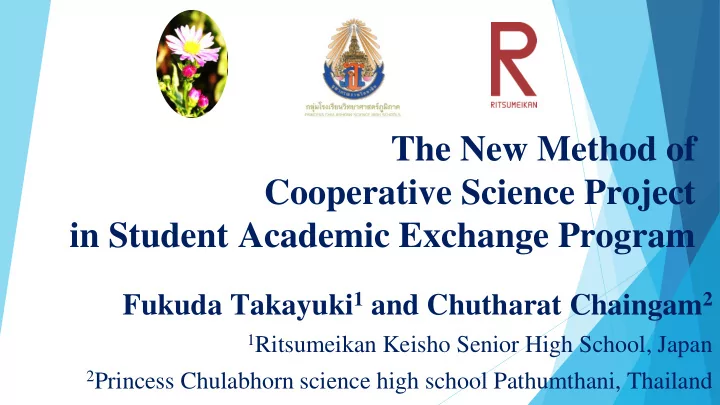

The New Method of Cooperative Science Project in Student Academic Exchange Program Fukuda Takayuki 1 and Chutharat Chaingam 2 1 Ritsumeikan Keisho Senior High School, Japan 2 Princess Chulabhorn science high school Pathumthani, Thailand
Index of this presentation ▶ Background and Introduction ▶ Methodology ▶ Cooperative science project ▶ LINE group ▶ Integrated students group coaching ▶ Academic exchange activities ▶ Results and Discussion ▶ Conclusion and Perspectives
▶ Background and Introduction Ritsumeikan Keisho PCSH Pahumthani SSH Project: Develop Cooperative Students Science Research ICU High Sapporo Kaisei
▶ Methodology - Cooperative science project Six-day academic exchange program at PCSHP Pre-experiment in each school About LINE group discussion within integrated students 1.5 month Discussion about activities and science project by contact persons (science teachers in each school)
▶ Methodology - LINE group Thai and Japanese students were gathered into LINE group to discuss research topic
▶ Methodology - I ntegrated students group coaching Student groups (Thai-Japanese integrated) cooperative Thai teacher Japanese teacher support
▶ Methodology - Academic exchange activities Several science surveys and experiments - Klongklone mangrove’s environmental research - Geoinformatics for environmental study - Chemistry, physics experiments - Statistic for scientific discussion - Visiting research institute
▶ Results and Discussion – Science project 5 group presentations of science research were done; - Bio organism related to acidification; case study, Ukikusa (Duckweed) - Natural sweetener extracted from Monk Fruit (Siraitia grosvenorii) - How to make Thai tap water drinkable - Water filter from bio-fiber - Indigo dyeing
▶ Results and Discussion – Questionnaire analysis - The usefulness of this program for your future science activities Japanese students Thai students 5 (very useful) 5 (very useful) 11% 14% 4 (useful) 4 (useful) 86% 89% Average 4.89 Average 4.86
▶ Results and Discussion – Questionnaire analysis - Do you think you would like to join another science exchange program? Thai students Japanese students 5% 5 (strongly I do) 5 (strongly I do) 22% 4 (I do) 4 (I do) 78% 95% Average 4.95 Average 4.77
▶ Results and Discussion – Questionnaire analysis - The length of this program Japanese students Thai students 0% 0% too long (0%) 11% 11% long (0%) 45% adequate 44% short 89% too short Requirement of more plenty time for their experiments
▶ Results and Discussion Questionnaire revealed suggestions: Japanese students - We would better discuss how much time we will set for cooperative science project, since many students seemed to be eager to concentrate on their project. - If they get some concrete result, they will be able to enjoy further a presentation activity outside of our program. - Thai students are so kind and full of hospitality's , also teachers are. - Science program was high level and quality for me, that was precious experience.
▶ Results and Discussion Questionnaire revealed suggestions: Thai students - We need more time for doing science project, so we should start discuss about proposal earlier and do more forehand experiments. - We would like to be partner with Japanese friends in all activities. - Japanese students are great learner that they love to learn every thing not only in Science but also culture. - After each academic program in a day we should do our experiments for science project every day. - We need time for report writing in group face to face, writing report together via social media is very difficult
▶ Conclusion and Perspectives Potentially successive in: - encouragement of students in using English in cooperative science project - development of alternative coaching techniques for integrated students group
Further works For the sake of further satisfying accomplishment in student projects - Improvement of the contents - Careful discussion on time schedule - Raise of teachers’ English proficiency
Thank you for your kind attention
Recommend
More recommend